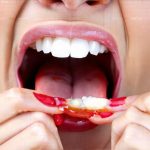Digestion is often viewed as something that happens in our stomachs – a mysterious internal process we rarely consciously think about. But what if the very first step in healthy digestion, the act of chewing, holds more power over our overall well-being than many realize? We live in a world of rushed meals and quick bites, prioritizing speed and convenience over mindful consumption. This often leads to inadequate chewing, potentially setting off a cascade of digestive issues that impact everything from nutrient absorption to energy levels and even gut health. Understanding the connection between how we chew and how well our bodies digest food is crucial for optimizing not just our physical health, but also our relationship with what we eat.
The importance of chewing extends far beyond simply breaking down food into smaller pieces. It’s a fundamental part of preparing food for efficient digestion throughout the entire digestive tract. When we don’t chew properly, we place an undue burden on subsequent organs – the stomach, small intestine, and large intestine – forcing them to work harder to compensate for incomplete initial processing. This can lead to discomfort, bloating, and malabsorption of essential nutrients. Moreover, the act of chewing itself triggers physiological responses that prime our digestive system for optimal function, signaling the release of necessary enzymes and hormones. Ignoring this crucial first step is akin to skipping a vital preparation stage in any complex process; the final outcome will likely be less effective and potentially problematic. If you struggle with digestion on some days, consider finding joy even when things aren’t ideal.
The Mechanics of Digestion & Why Chewing Matters
Digestion isn’t just about breaking down food mechanically; it’s a sophisticated chemical process. It begins in the mouth, where saliva – containing enzymes like amylase – starts to break down carbohydrates. This initial breakdown is significantly enhanced by thorough chewing. The more you chew, the more surface area is created for these enzymes to work on, maximizing their effectiveness. But even beyond enzymatic action, chewing physically breaks down food particles into smaller, more manageable sizes. Larger chunks of food require more effort from the stomach to churn and break down, potentially leading to slower digestion and feelings of fullness or bloating.
Consider what happens when you quickly swallow a large bite: it forces your stomach to work harder, delaying gastric emptying (the rate at which food moves from the stomach to the small intestine). This can disrupt nutrient absorption as well. Furthermore, adequate chewing stimulates the vagus nerve, a key component of the parasympathetic nervous system – often called the “rest and digest” system. Vagal stimulation promotes relaxation, reduces stress, and optimizes digestive function. In contrast, hurried eating bypasses this vital connection, potentially contributing to stress and compromised digestion. Recognizing the patterns of your digestion can help you understand what triggers issues.
The process can be summarized in these points:
– Saliva production is initiated by chewing, containing enzymes for carbohydrate breakdown.
– Mechanical breakdown increases surface area for enzymatic action.
– Vagal nerve stimulation promotes relaxation and digestive efficiency.
– Proper chewing aids gastric emptying and nutrient absorption.
Ultimately, the quality of your digestion directly correlates with how well you chew. It’s a foundational element often overlooked in discussions about gut health and overall wellness. You may even need to train your gut for better tolerance over time.
Consequences of Insufficient Chewing
Insufficient chewing can lead to a variety of digestive issues, ranging from mild discomfort to more significant problems. One common consequence is blooting and gas production. When food isn’t properly broken down in the mouth, it arrives in the stomach as larger particles, requiring increased fermentation by gut bacteria. This bacterial activity produces gases like hydrogen, methane, and carbon dioxide, resulting in bloating, flatulence, and abdominal discomfort. Another frequent outcome is indigestion – a feeling of fullness, pressure, or pain in the upper abdomen.
Beyond immediate discomfort, chronic insufficient chewing can contribute to malabsorption of nutrients. If food isn’t adequately broken down, your body may struggle to extract essential vitamins, minerals, and antioxidants. This can lead to deficiencies over time, impacting energy levels, immune function, and overall health. Some research even suggests a link between poor chewing habits and increased risk of gastrointestinal disorders like irritable bowel syndrome (IBS). While the connection isn’t fully understood, it highlights the potential long-term consequences of neglecting this fundamental aspect of digestion. Be mindful of seed oils as they can contribute to gut reactions in some individuals.
Improving Your Chewing Habits: Practical Strategies
Fortunately, improving your chewing habits is relatively straightforward – it primarily requires mindfulness and intentionality. Here are some steps you can take to incorporate more conscious chewing into your daily routine:
- Slow Down: This is the most crucial step. Reduce distractions during mealtimes (turn off the TV, put away your phone) and focus on savoring each bite. Aim to eat at a slower pace, allowing yourself time to thoroughly chew each mouthful before taking another.
- Count Your Chews: A simple exercise involves counting how many times you chew each bite. Start with a goal of 20-30 chews per bite and gradually increase as comfortable. This helps build awareness and encourages more thorough chewing.
- Focus on Texture: Pay attention to the texture of your food. Notice how it changes as you chew, from its initial form to a smoother, creamier consistency. This sensory experience can enhance enjoyment and encourage longer chewing times.
The Role of Food Consistency
The type of food you’re eating also impacts how much chewing is required. Softer foods, like yogurt or cooked vegetables, generally require less chewing than harder, denser foods like raw carrots or nuts. However, even with softer foods, it’s important to chew adequately to initiate the digestive process and fully mix the food with saliva. Focusing on incorporating a variety of textures into your diet can also encourage more mindful chewing.
- Consider adding crunchy vegetables to salads
- Choose whole grains over refined carbohydrates
- Include healthy fats like avocado or nuts in your meals.
These foods not only provide valuable nutrients but also require more chewing, contributing to better digestion and satiety. Remember that the goal isn’t necessarily to chew every bite a specific number of times, but rather to thoroughly break down food into smaller particles before swallowing. If you are experiencing inflammation, knowing what to eat can be helpful.
Mindful Eating & The Bigger Picture
Improving your chewing habits is about more than just optimizing digestion; it’s also about cultivating mindful eating. This involves paying attention to the sensory experience of eating – the sight, smell, texture, and taste of food. By slowing down and focusing on these aspects, you can develop a deeper appreciation for your meals and become more attuned to your body’s hunger and fullness cues.
Mindful eating can also help reduce overeating and promote healthier portion sizes. When you chew thoroughly and savor each bite, it takes longer to eat, allowing your brain time to register feelings of satiety. This can prevent you from consuming excessive amounts of food and contribute to better weight management. In essence, chewing isn’t just a mechanical process; it’s an integral part of a holistic approach to health and well-being. By prioritizing mindful chewing, you’re not only improving your digestion but also fostering a healthier relationship with food and your body. Be aware that sauces can be a hidden danger zone for sensitive individuals.


















